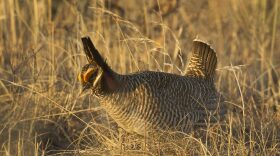-
The senator said he was grateful to dedicated editors, reporters and staff whose contributions made his hometown paper informative and beloved.
-
Farmers who were promised funding through the federal Regional Food Business Centers have been left in limbo after the Trump administration shut down the program. The U.S. Department of Agriculture says it will honor grants the program already approved, but it's unclear when.
-
A May tornado left significant wreckage in this small, western Kansas town
-
Many towns in western Kansas lack gyms and fitness centers. Some small communities are building outdoor walking trails to encourage better health and attract new residents.
-
Kansas has reported 37 cases. Wichita hasn't had a case since 2017.
-
The Lesser Prairie-Chicken Landowner Alliance aims to earn money while preserving habitat for the endangered bird.
-
Federal immigration enforcement moved through western Kansas and detained several people. It comes after President Donald Trump promised deportations of people in the country without legal status. Southwest Kansas has a high percentage of immigrants.
-
Another year of dry conditions could hurt production for farmers growing crops and raising livestock in the region.
-
The Wizard of Oz and Kansas have been inseparable since farm girl Dorothy Gale first skipped down the yellow brick road. But having an enduring image from the Dust Bowl 1930s might also hold Kansas back from what it wants to be today.
-
Water levels in the Ogallala Aquifer continue to plummet as farm irrigation swallows an average of more than 2 billion gallons of groundwater per day statewide. But after decades of mostly inaction from Kansas leaders, the state’s approach to water conservation might finally be starting to shift.

Play Live Radio
Next Up:
0:00
0:00
Available On Air Stations










